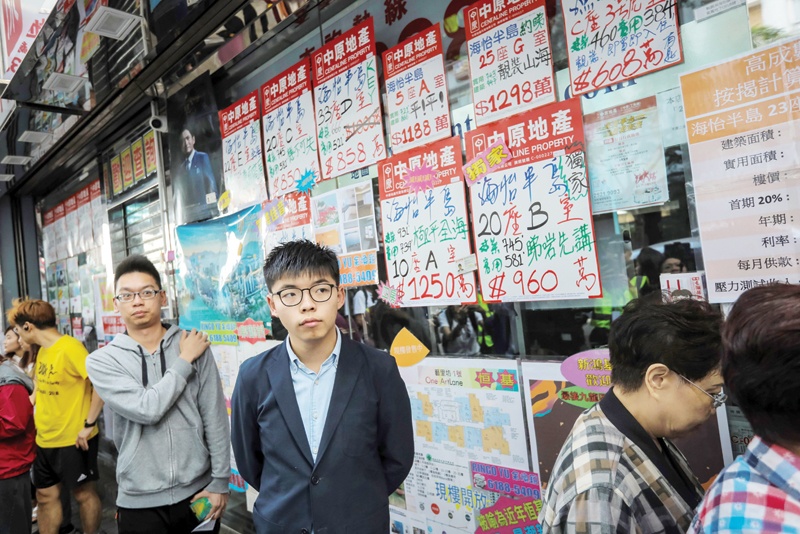HONG KONG: Jailed dissident Joshua Wong yesterday joined the ranks of Hong Kong democracy figures arrested under a new security law as the United States threatened fresh sanctions in response to Beijing's mounting crackdown in the finance hub. More than 1,000 police officers detained 53 prominent figures-including a US citizen-in dawn raids Wednesday on charges of "subversion", a new national security crime that carries up to life in prison.
The sweep was the latest salvo in Beijing's battle to stamp out dissent in the semi-autonomous city after millions hit the streets in 2019 with huge and sometimes violent democracy protests. A senior police source told AFP that Wong-who is currently behind bars-was arrested on a new charge of subversion, the first time he has been detained under the national security law.
The 24-year-old is one of the city's most recognizable democracy advocates and is currently serving a sentence for his role in organizing democracy protests.
Wong's Facebook account later posted a statement saying he was being questioned on suspicion of violating the security law. Local media reported Tam Tak-chi, another activist currently in custody on a sedition charge, was also arrested for subversion yesterday morning.
International anger
Western nations have accused Beijing of using its crackdown to shred the freedoms that were promised under the "One Country, Two Systems" setup when the former British colony was returned to China. "The United States will not stand idly by while the people of Hong Kong suffer under Communist oppression," said US Secretary of State Mike Pompeo, adding the outgoing Trump administration would consider new sanctions.
Washington has already sanctioned multiple Chinese and Hong Kong officials, including city leader Carrie Lam. Chinese foreign ministry spokeswoman Hua Chunying dismissed Pompeo's threat as the "final madness" of an outgoing administration. "This kind of move... will surely be punished by history," she told reporters. But the US was not alone in its criticism. British foreign minister Dominic Raab called the detentions "a grievous attack on Hong Kong's rights and freedoms" and said Beijing "deliberately misled the world about the true purpose" of the security law.
Canada, France and the European Union also issued statements condemning sliding freedoms in Hong Kong and called for the release of those detained. On Thursday the UN's rights watchdog said the arrests confirmed fears the security law "is indeed being used to detain individuals for exercising legitimate rights to participate in political and public life".
Beijing 'firmly in control'
The alleged offence of those arrested for subversion was to organize an unofficial primary last summer to decide who would stand as candidates for the city's partially-elected legislature in the hopes they might take a majority for the first time. Many of those candidates were ultimately disqualified from standing and authorities scrapped the election because of the coronavirus. But Chinese and Hong Kong officials have labeled the primary as an attempt to "overthrow" and "paralyze" the city's government and therefore a threat to national security. Analysts said it was a new watershed moment for the semi-autonomous city.
"Very clearly and unequivocally it demonstrates the Chinese government's control over Hong Kong," Dylan Loh, an expert on China's politics at Singapore's Nanyang Technological University, told AFP. "There should be no illusions anymore that the central government is firmly in control," he added. Those detained are a broad cross-section of Hong Kong's opposition, from veteran former pro-democracy lawmakers such as James To, Andrew Wan, Lam Cheuk-ting and Claudia Mo to a host of younger activists. John Clancey, an American national and long-term Hong Kong resident who worked at a prominent human rights law firm, was also arrested for subversion. Hong Kong police can hold anyone arrested for up to 48 hours before they must be presented in court.
Those charged with national security crimes are not usually granted bail. The national security law was imposed on Hong Kong in late June in response to the 2019 protests, targeting acts Beijing deems to be secession, subversion, terrorism and collusion with foreign forces. Officials said the security law would target only an "extreme minority" and was needed to restore stability after the huge and often violent democracy rallies. The law has swiftly silenced dissent and outlawed a host of peaceful political views, with dozens of prominent figures targeted even before Wednesday's operation. Over the course of the last year, prominent democracy supporters have been arrested, jailed, barred from politics or have fled overseas. - AFP



